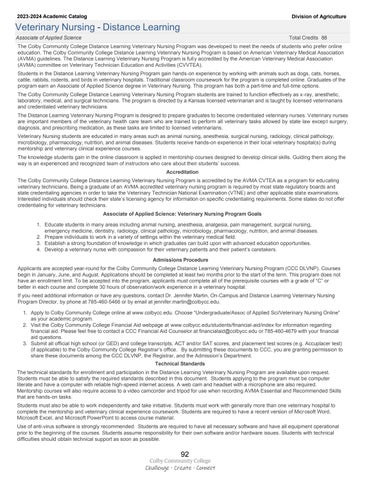2023-2024 Academic Catalog
Division of Agriculture
Veterinary Nursing - Distance Learning Associate of Applied Science
Total Credits 88
The Colby Community College Distance Learning Veterinary Nursing Program was developed to meet the needs of students who prefer online education. The Colby Community College Distance Learning Veterinary Nursing Program is based on American Veterinary Medical Association (AVMA) guidelines. The Distance Learning Veterinary Nursing Program is fully accredited by the American Veterinary Medical Association (AVMA) committee on Veterinary Technician Education and Activities (CVVTEA). Students in the Distance Learning Veterinary Nursing Program gain hands-on experience by working with animals such as dogs, cats, horses, cattle, rabbits, rodents, and birds in veterinary hospitals. Traditional classroom coursework for the program is completed online. Graduates of the program earn an Associate of Applied Science degree in Veterinary Nursing. This program has both a part-time and full-time options. The Colby Community College Distance Learning Veterinary Nursing Program students are trained to function effectively as x-ray, anesthetic, laboratory, medical, and surgical technicians. The program is directed by a Kansas licensed veterinarian and is taught by licensed veterinarians and credentialed veterinary technicians. The Distance Learning Veterinary Nursing Program is designed to prepare graduates to become credentialed veterinary nurses. Veterinary nurses are important members of the veterinary health care team who are trained to perform all veterinary tasks allowed by state law excep t surgery, diagnosis, and prescribing medication, as these tasks are limited to licensed veterinarians. Veterinary Nursing students are educated in many areas such as animal nursing, anesthesia, surgical nursing, radiology, clinical pathology, microbiology, pharmacology, nutrition, and animal diseases. Students receive hands-on experience in their local veterinary hospital(s) during mentorship and veterinary clinical experience courses. The knowledge students gain in the online classroom is applied in mentorship courses designed to develop clinical skills. Guiding them along the way is an experienced and recognized team of instructors who care about their students’ success. Accreditation The Colby Community College Distance Learning Veterinary Nursing Program is accredited by the AVMA CVTEA as a program for educating veterinary technicians. Being a graduate of an AVMA accredited veterinary nursing program is required by most state regulatory boards and state credentialing agencies in order to take the Veterinary Technician National Examination (VTNE) and other applicable state examinations. Interested individuals should check their state’s licensing agency for information on specific credentialing requirements. Some states do not offer credentialing for veterinary technicians. Associate of Applied Science: Veterinary Nursing Program Goals 1. Educate students in many areas including animal nursing, anesthesia, analgesia, pain management, surgical nursing, emergency medicine, dentistry, radiology, clinical pathology, microbiology, pharmacology, nutrition, and animal diseases. 2. Prepare individuals to work in a variety of settings within the veterinary medical field. 3. Establish a strong foundation of knowledge in which graduates can build upon with advanced education opportunities. 4. Develop a veterinary nurse with compassion for their veterinary patients and their patient’s caretakers. Admissions Procedure Applicants are accepted year-round for the Colby Community College Distance Learning Veterinary Nursing Program (CCC DLVNP). Courses begin in January, June, and August. Applications should be completed at least two months prior to the start of the term. This program does not have an enrollment limit. To be accepted into the program, applicants must complete all of the prerequisite courses with a grade of “C” or better in each course and complete 30 hours of observation/work experience in a veterinary hospital. If you need additional information or have any questions, contact Dr. Jennifer Martin, On-Campus and Distance Learning Veterinary Nursing Program Director, by phone at 785-460-5466 or by email at jennifer.martin@colbycc.edu. 1. Apply to Colby Community College online at www.colbycc.edu. Choose “Undergraduate/Assoc of Applied Sci/Veterinary Nursing Online” as your academic program. 2. Visit the Colby Community College Financial Aid webpage at www.colbycc.edu/students/financial-aid/index for information regarding financial aid. Please feel free to contact a CCC Financial Aid Counselor at financialaid@colbycc.edu or 785-460-4679 with your financial aid questions. 3. Submit all official high school (or GED) and college transcripts, ACT and/or SAT scores, and placement test scores (e.g. Accuplacer test) (if applicable) to the Colby Community College Registrar’s office. By submitting these documents to CCC, you are granting permission to share these documents among the CCC DLVNP, the Registrar, and the Admission’s Department. Technical Standards The technical standards for enrollment and participation in the Distance Learning Veterinary Nursing Program are available upon request. Students must be able to satisfy the required standards described in this document. Students applying to the program must be computer literate and have a computer with reliable high-speed internet access. A web cam and headset with a microphone are also required. Mentorship courses will also require access to a video camcorder and tripod for use when recording AVMA Essential and Recommended Skills that are hands-on tasks. Students must also be able to work independently and take initiative. Students must work with generally more than one veterinary hospital to complete the mentorship and veterinary clinical experience coursework. Students are required to have a recent version of Microsoft Word, Microsoft Excel, and Microsoft PowerPoint to access course material. Use of anti-virus software is strongly recommended. Students are required to have all necessary software and have all equipment operational prior to the beginning of the courses. Students assume responsibility for their own software and/or hardware issues. Students with technical difficulties should obtain technical support as soon as possible.
92
Colby Community College Challenge ∙ Create ∙ Connect















